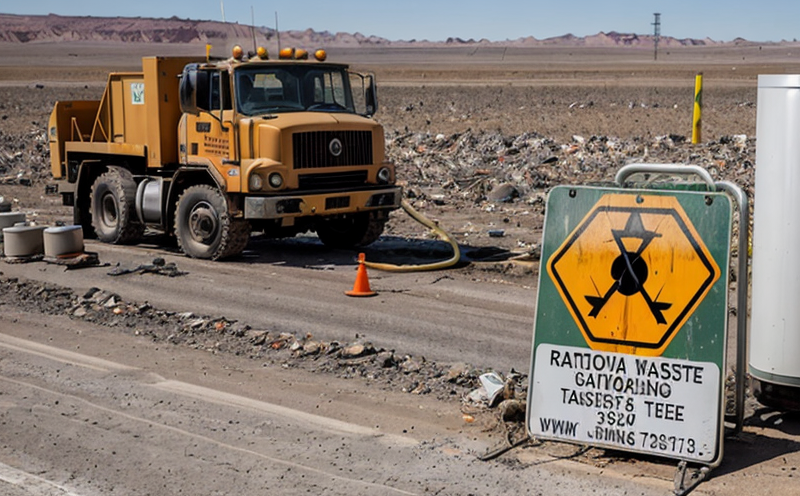Radioactive Waste Testing & Characterization
The process of radioactive waste testing and characterization is a critical aspect within the broader domain of radiation and nuclear testing. This service ensures the safe handling, transportation, storage, and disposal of radioactive materials by providing comprehensive data on their properties, behavior under various conditions, and potential risks.
The primary purpose of this testing involves characterizing the waste to understand its radioactivity levels, chemical composition, physical form, and stability over time. This characterization is vital for compliance with regulatory standards such as ISO, ASTM, and IEC. The data generated from these tests helps in determining the appropriate disposal methods, assessing potential environmental impacts, and ensuring worker safety.
The testing process involves several steps. Initially, samples of radioactive waste are collected under controlled conditions to avoid contamination or alteration of the sample's properties. These samples are then analyzed using a range of techniques including gamma spectroscopy, alpha particle spectrometry, beta counting, and neutron activation analysis. The results provide detailed information on isotopic content, decay rates, and other relevant parameters.
The equipment used for these analyses includes advanced spectrometers, calorimeters, and specialized radiation detectors that are capable of accurately measuring low levels of radioactivity. Compliance with international standards such as ISO 6307-2 ensures the reliability and accuracy of the test results.
The characterization also includes assessing the physical form and stability of the waste, which is crucial for determining how it should be handled during transport and storage. This involves evaluating factors such as the likelihood of leakage or contamination under various conditions. The results are used to determine if the waste can be classified into different categories according to regulatory requirements.
Understanding these aspects helps in making informed decisions regarding disposal methods, which could range from shallow land burial to deep geological repositories. It also aids in identifying potential risks and developing mitigation strategies. Compliance with regulations such as U.S. EPA or OECD-NEA is essential to ensure the safety of workers, the public, and the environment.
The importance of this service extends beyond regulatory compliance; it plays a crucial role in advancing nuclear science and technology. By providing accurate data on waste properties, it supports research into safer handling methods, more efficient storage solutions, and innovative disposal techniques. This knowledge is vital for the sustainable development of nuclear energy and other applications that involve radioactive materials.
Applied Standards
The testing and characterization of radioactive waste are governed by a variety of international standards designed to ensure safety, reliability, and consistency in results. Some key standards include:
- ISO 6307-2: Determination of activity concentration of radionuclides in environmental samples
- ASTM International Nuclear Standards
- IEC standards on nuclear instrumentation and safety
These standards provide guidelines for sample preparation, analytical methods, data interpretation, and reporting. Compliance with these standards ensures that the results of testing are accurate, reliable, and comparable across different laboratories.
The standards also emphasize the importance of quality assurance measures to minimize errors and ensure consistency in test results. This includes regular calibration of equipment, training of personnel, and adherence to standardized procedures. By following these guidelines, laboratories can provide high-quality data that is trusted by regulatory bodies and industry stakeholders.
Environmental and Sustainability Contributions
The testing and characterization of radioactive waste contribute significantly to environmental sustainability and safety. By providing accurate information on the properties of radioactive materials, this service helps in making informed decisions regarding their disposal methods. This can lead to more efficient use of resources and reduced environmental impact.
For example, the data generated from these tests can help identify the most suitable storage facilities for long-lived radioactive waste, reducing the need for frequent relocation or additional treatment processes. This not only saves costs but also minimizes the overall carbon footprint associated with the management of radioactive materials.
The results of this testing are crucial in ensuring compliance with environmental regulations and international treaties aimed at protecting human health and the environment from radiation exposure. By providing reliable data, this service supports efforts to achieve sustainable development goals related to nuclear technology.
Moreover, the knowledge gained from these tests can contribute to advancements in nuclear science and technology. This includes exploring new methods for recycling radioactive materials, developing safer handling techniques, and designing more efficient storage solutions. These innovations can further enhance environmental sustainability by reducing waste generation and minimizing risks associated with radioactive materials.
Use Cases and Application Examples
| Use Case | Description |
|---|---|
| Hazardous Waste Management | Characterization of radioactive waste to determine appropriate disposal methods. |
| Nuclear Medicine Facilities | Evaluation of medical waste for compliance with regulatory standards. |
| Research Laboratories | Assessment of experimental waste generated in nuclear research. |
| Industrial Processes | Monitoring and characterization of radioactive by-products from industrial operations. |
- Hazardous Waste Management: Ensuring compliance with regulations for the safe handling and disposal of radioactive waste.
- Nuclear Medicine Facilities: Guaranteeing that medical waste meets strict safety standards.
- Research Laboratories: Supporting advancements in nuclear science through accurate data on experimental waste.
- Industrial Processes: Monitoring by-products to prevent environmental contamination and ensure worker safety.





